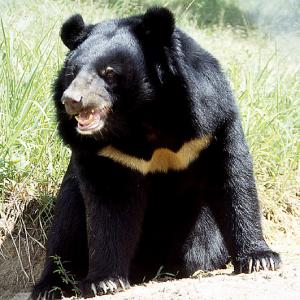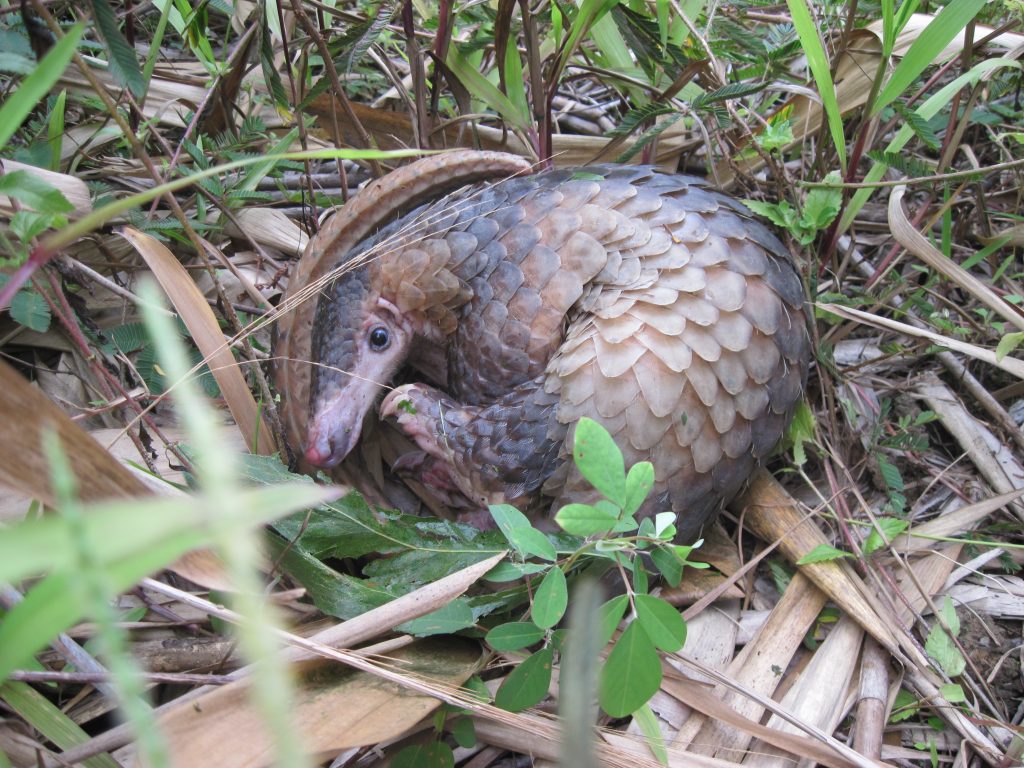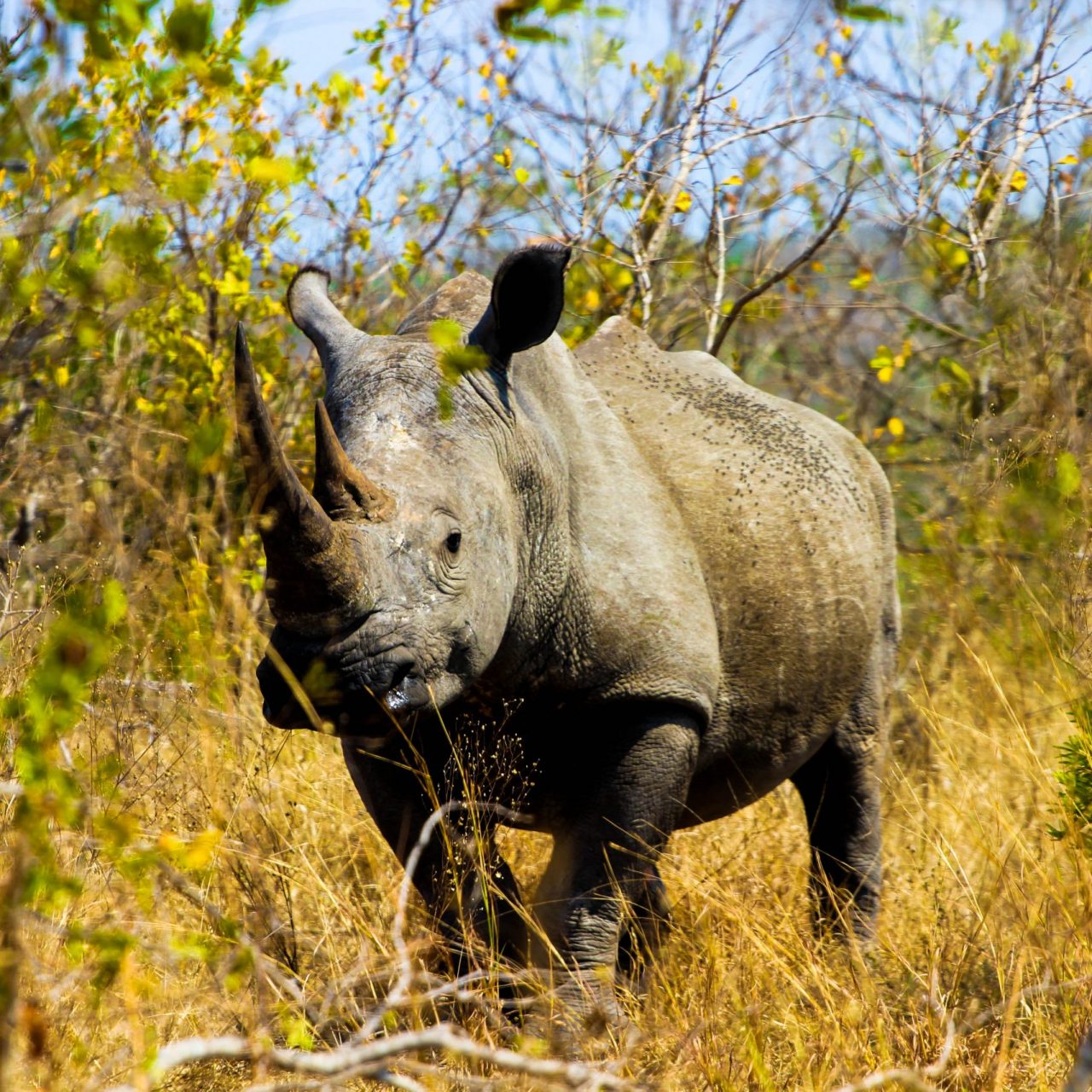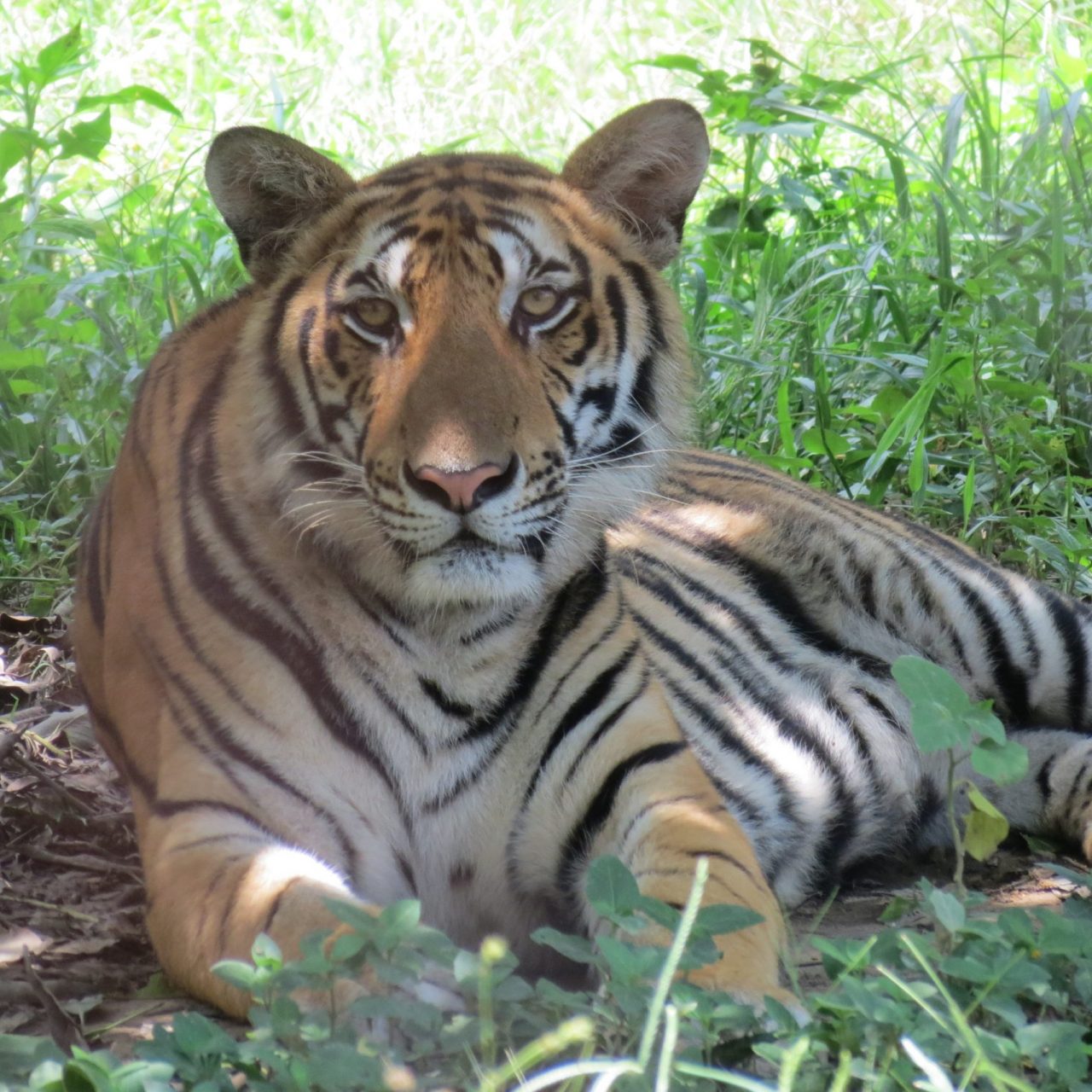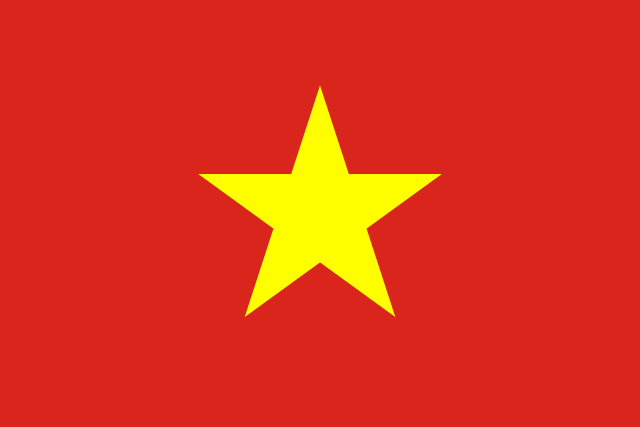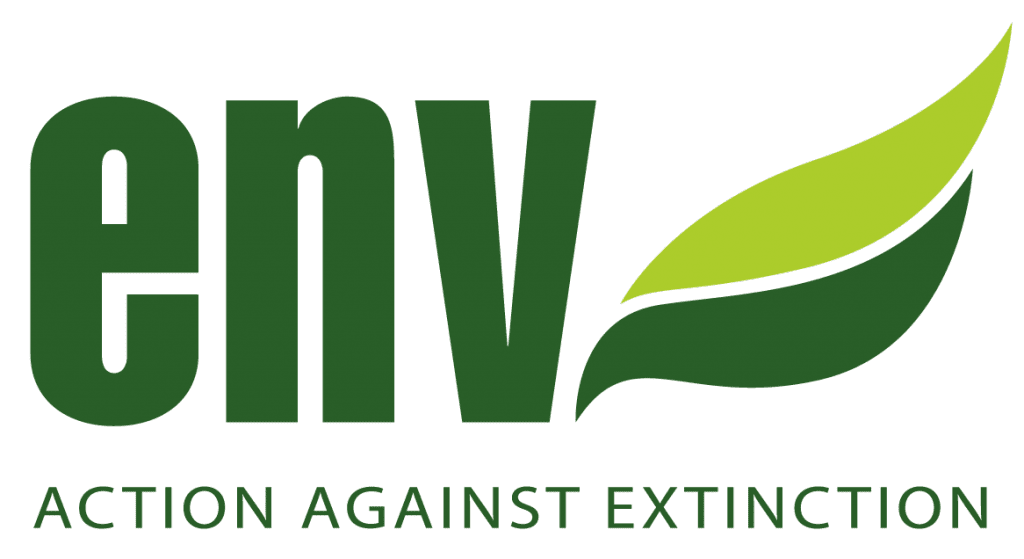Bears are held captive in Vietnam for their bile which is believed to hold medicinal value. For 15 years, ENV has been working with NGO partners, the Vietnamese government, and law enforcement to free captive bears and end the bear bile industry in Vietnam.
In 2005 when ENV began tackling Vietnam’s bear bile industry, there were more than 4,300 bears on bear farms! As of March 2021, less than 380 bears remain. This progress shows Vietnam is capable of ending the bear bile industry, but there are still hundreds of bears to free to ensure this vision becomes a reality.
Vietnam is home to two species of bear: the Asiatic black bear (Ursus thibetanus), also known as the moon bear, and the Malayan sun bear (Helarctos malayanus). Both species are protected under Vietnamese law, Decree 160 (2013), which was recently amended by Decree 64 (2019). It is illegal to hunt, trap, possess, kill, sell, or advertise bears or bear products in Vietnam. They are also protected by international law under CITES, prohibited from international trade as Appendix I species.
Vietnam saw rapid economic growth in the 1990s which resulted in more people being able to afford the medicine that had previously been unavailable to them. At this time, the use of bear bile became a popular traditional medicine across the country to cure a variety of ailments. To meet the growing demand, bears (mostly Asiatic black bears as they produce more bile) were hunted from the wild and sold live to bear farms in 57 of Vietnam’s 63 provinces.
At bear bile farms, the large wild animals are confined to small cages where they can barely move their bodies, often force-fed beer which stimulates bile production, then kept there for the remainder of their lives which can be 20 to 30 years.
Bear bile farming has been illegal in Vietnam for decades. However, enforcement of the law only began in 2005 when the Vietnamese government initiated efforts to stop the illegal extraction, sale, and even possession of bear bile. At this time, there were not many rescue centers for bears in Vietnam, and as a result, law enforcement could not confiscate all 4,300 bears from individual residences. As a solution, bear owners were allowed to keep their bears, but each bear was microchipped and authorities started conducting regular inspections to make sure the owners were not obtaining new bears from the wild or extracting and selling the bears’ bile.
At the same time, ENV began awareness campaigns aimed at reducing demand for bear bile in Vietnam. In 2011, ENV started convincing missions to persuade bear owners to release their bears to rescue centers.
Due to decreasing demand for bear bile and the illegal nature of the industry, there is no longer any legal monetary value to keeping bears. ENV communicates these important facts with bear farmers, urging them to voluntarily transfer their bears to one of the seven rescue centers throughout Vietnam where they can live the rest of their lives in peace.
ENV Bear Team
Since 2011, ENV has been pressuring bear owners to give up their captive bears. On one hand, the campaign targets bear owners through monthly communications, sending them postcards or letters with strong messages to urge them to stop bear farming. On the other hand, quarterly communications target chairmen in areas with prevalent bear farming, pushing them to address illegal activities within their jurisdiction and encourage their local bear owners to give up their bears.
ENV keeps record of bear farming hotspots by monitoring the farms, profiling owners, and documenting violations. Inspections coincide with other monthly campaign activities in bear farming communities such as events at schools and markets. Authorities have reported that ENV’s focus on bear farmers has made a substantial impact on the attitude of farmers, evidenced by the increasing amount of farmers choosing to release their bears.
Wildlife Crime Unit
ENV’s Wildlife Crime Unit (WCU) is involved in the regular monitoring of bear farms which are conducted by government authorities and ENV NGO partners. ENV’s WCU also investigates and responds to public reports of crimes involving bears or bear products.
Policy & Legislation
When information regarding a bear crime is uncovered by ENV investigation or reported to ENV by the public, our legal team works with Vietnamese authorities to ensure the criminal is punished according to the law. ENV also works to build support among key government leaders to strengthen policy and legislation protecting bears and accelerating an end to bear farming in Vietnam.
Public Awareness
ENV recognizes the importance of reducing demand for bear bile to successfully end bear farming and trade. Reductions in demand must correspond with the phasing out of bear farms, or consumers will simply purchase bear bile products elsewhere, such as from farms in China or Laos.
Educating the public through our Major Bear Campaigns achieves this reduction in demand and encourages more of the public to report bear crimes to ENV’s Wildlife Crime Hotline.
While many provinces in Vietnam have taken great strides to become bile bear-free in recent years, Hanoi (and especially Hanoi’s Phuc Tho district) remains the biggest bear bile farming hotspot in the country. Hanoi’s Phuc Tho district holds more than 40% of Vietnam’s total captive bile bears and 90% of Hanoi’s bile bears.
To eliminate this illegal industry happening right in the nation’s capital, ENV focuses many efforts on educating students in Phuc Tho and reaching out to residents to call for decisive action from authorities and bear owners to end this outdated and cruel practice.
In 2019, students from 910 schools across the country submitted at total of 97,184 letters urging bear owners to end their cruel and illegal business and transfer their bears to rescue centers.
At the conclusion of the contest, a total of 11 winners were awarded prizes for their efforts (seven individual prizes, two creative prizes, and two group prizes). Winning entries ranged from a letter written from the perspective of a bear longing for its freedom, an ex-bear owner persuading a colleague to quit farming bears, to illustrated poems, letters from the future, and a personal plea to a bear-owning father. These winning entries were selected from a shortlist of 100 entries by a panel of judges comprised of an established writer, a literature teacher, and ENV senior staff members. The Letter Writing Challenge and its ceremony were hosted as part of a broader partnership by the End Bear Farming Coalition comprised of World Animal Protection, Four Paws, and ENV to expedite an end to bear farming in Vietnam.
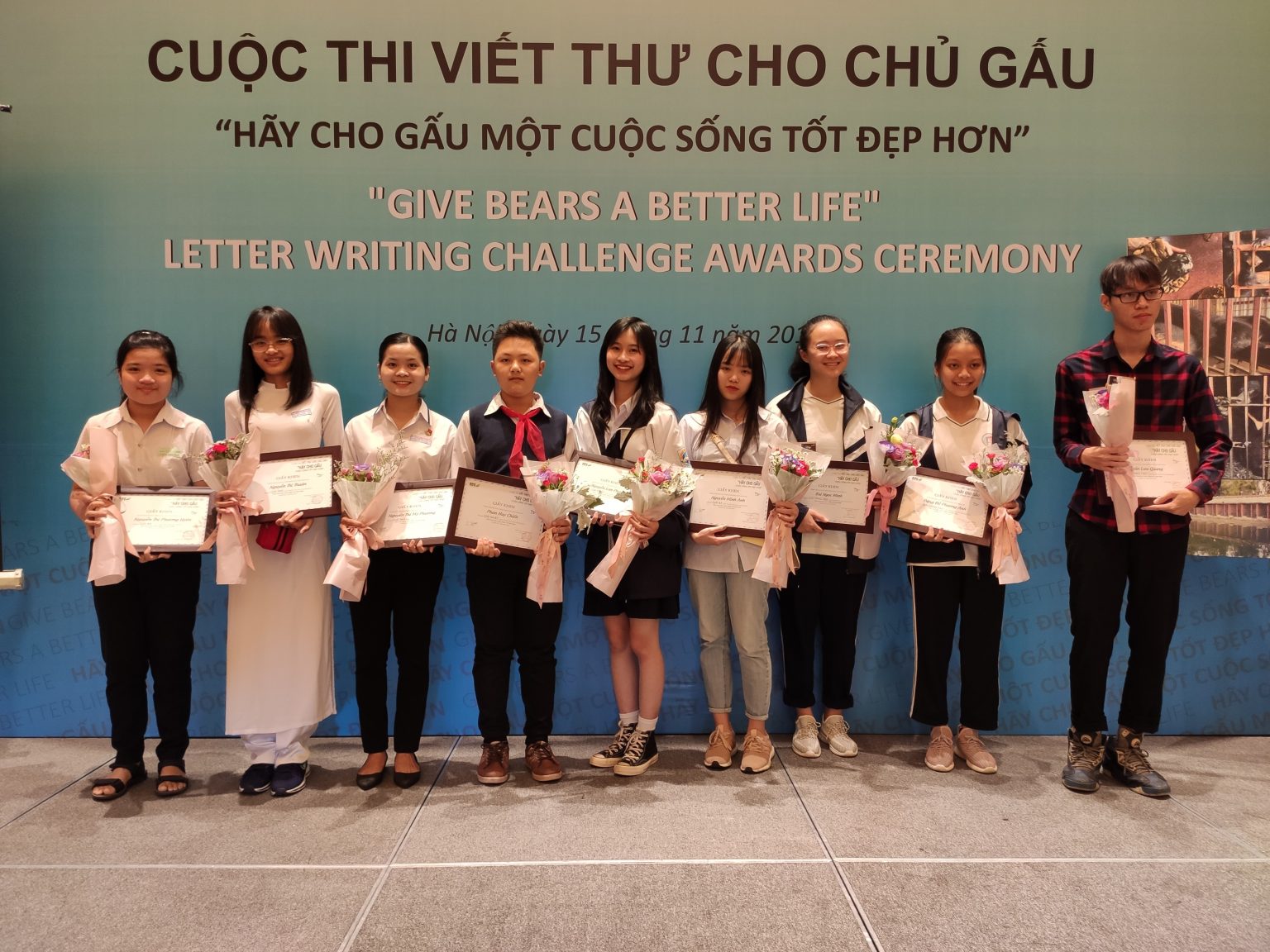
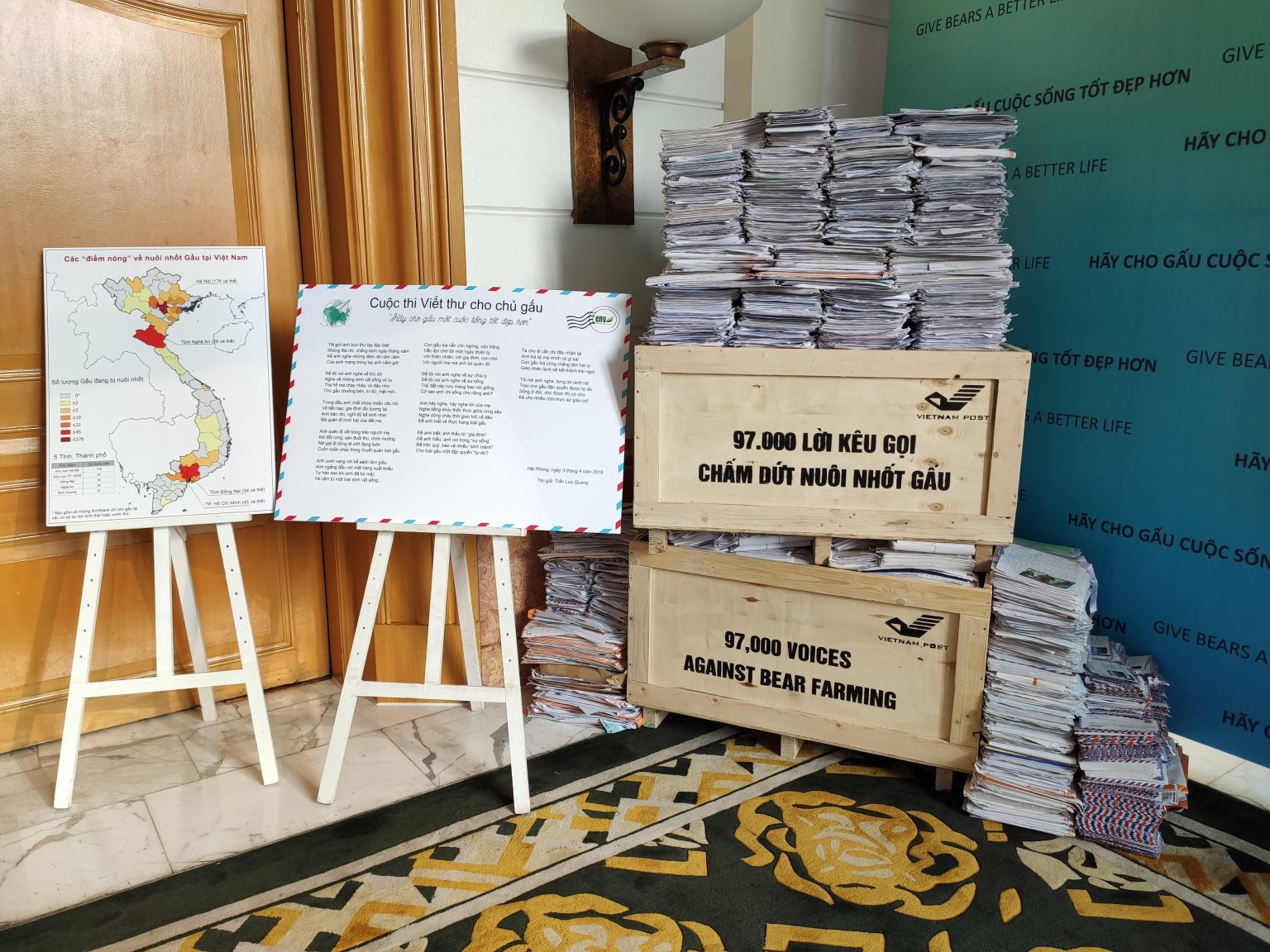
Up to 60 TV stations across Vietnam air ENV’s Public Service Announcements (PSAs) to millions of viewers every year. Additionally, news websites, buses, and trains in Vietnam also broadcast selected ENV PSAs to members of the public to reduce demand for bear bile and push for an end to Vietnamese bear bile farms.
In December 2017, more than 800 runners from 43 countries came together in Hanoi to raise awareness for bear farming in Vietnam. The event was hosted by ENV, Red River Runners and Sporting Republic, and teams of runners included representatives from the European Union Delegation in Vietnam, American, British and French embassies, as well as the famous writer Trang Ha and popular VTV television host Mai Trang.
How You Can Help
You can help accelerate the end to bear farming in Vietnam by supporting these on-the-ground efforts that are crucial for protecting bears from exploitation. As a small NGO, our work to protect wildlife is sustained by donors like you who want to help make a lasting impact on the protection of wildlife and our Earth.
